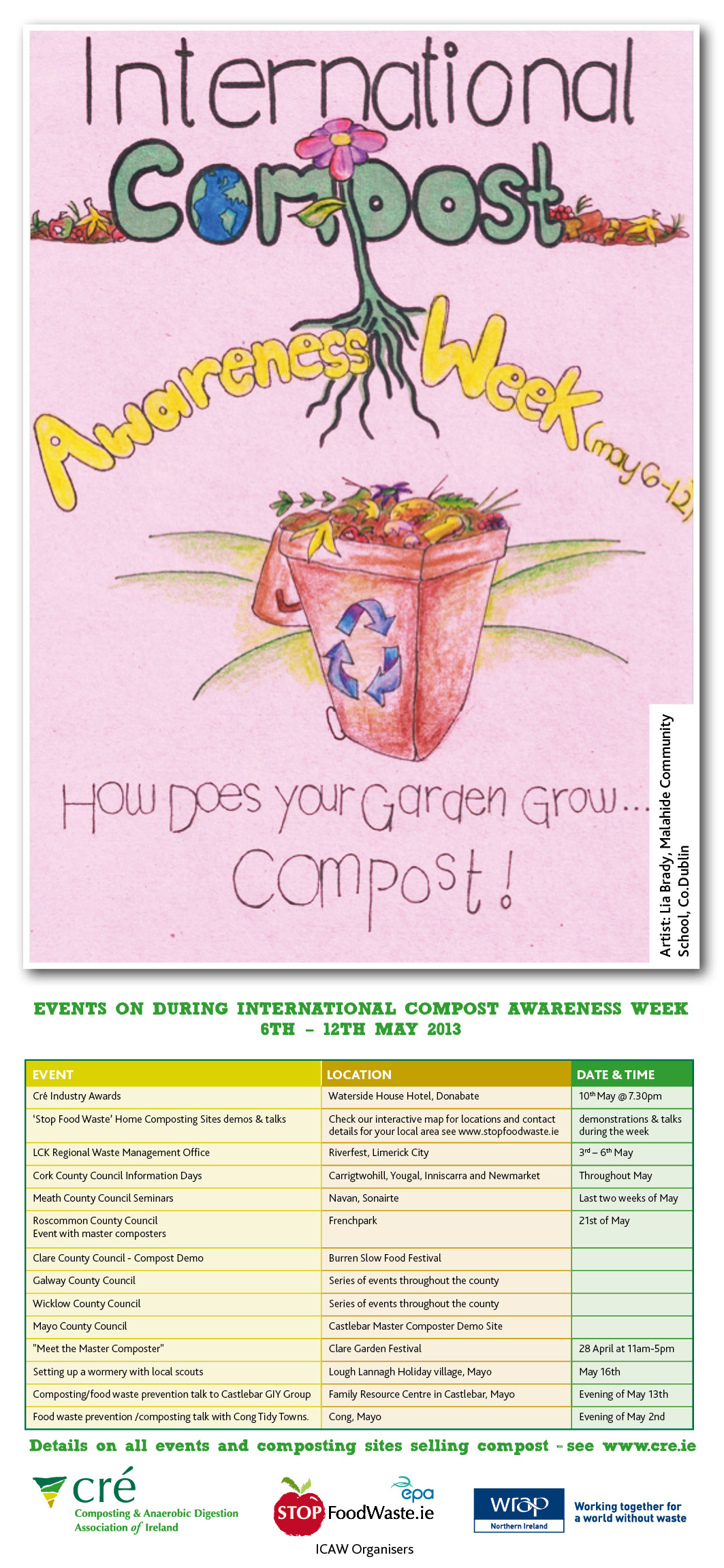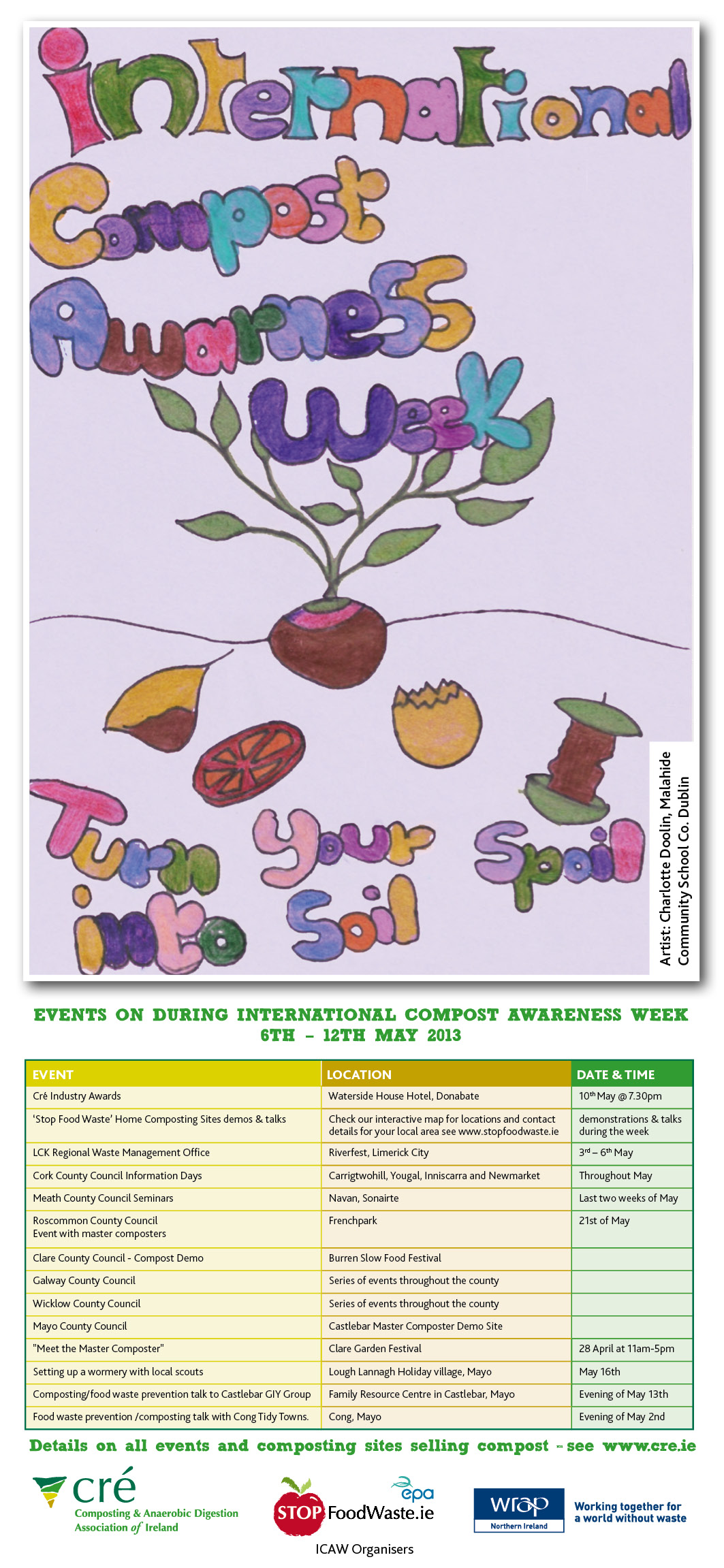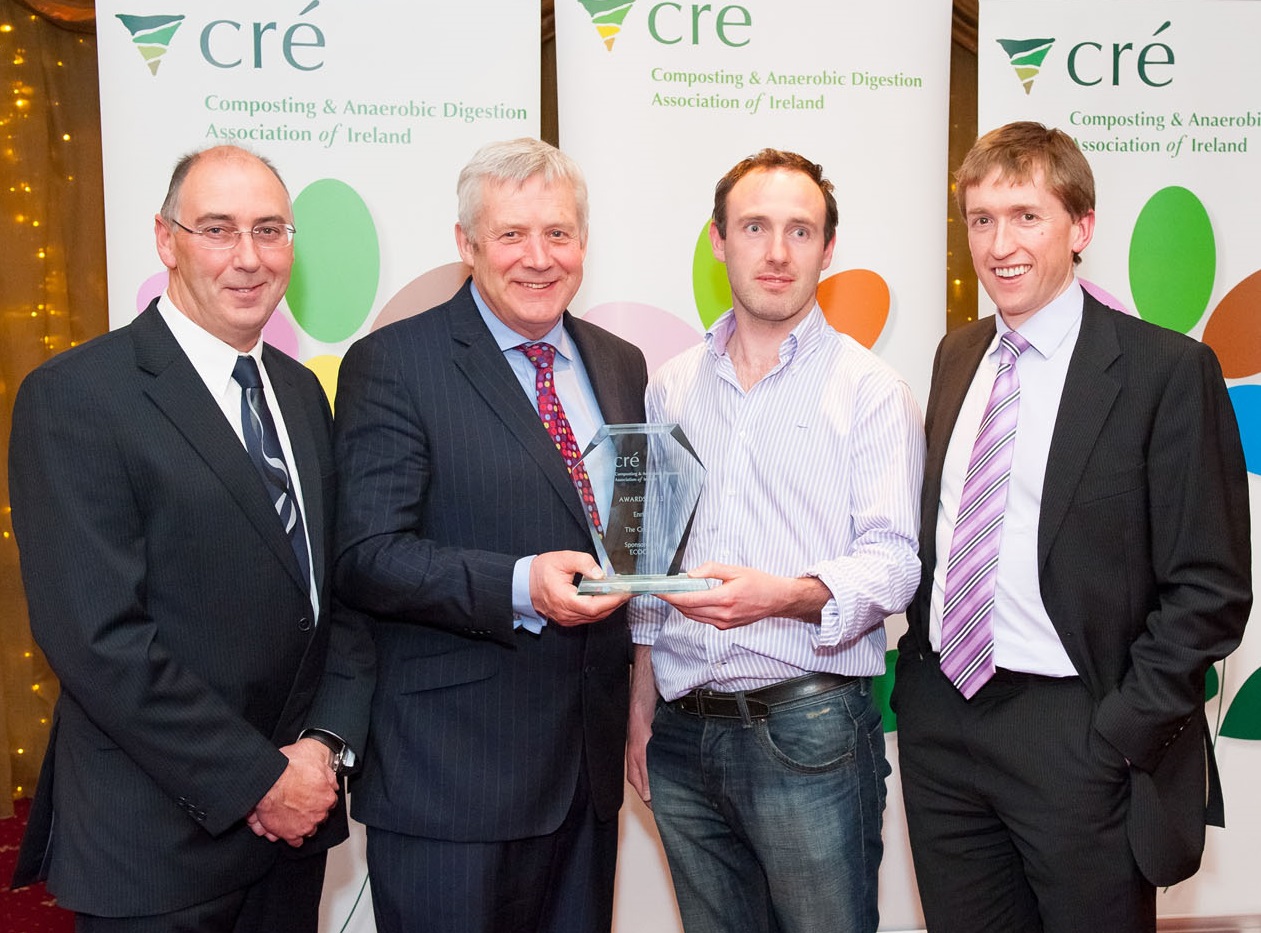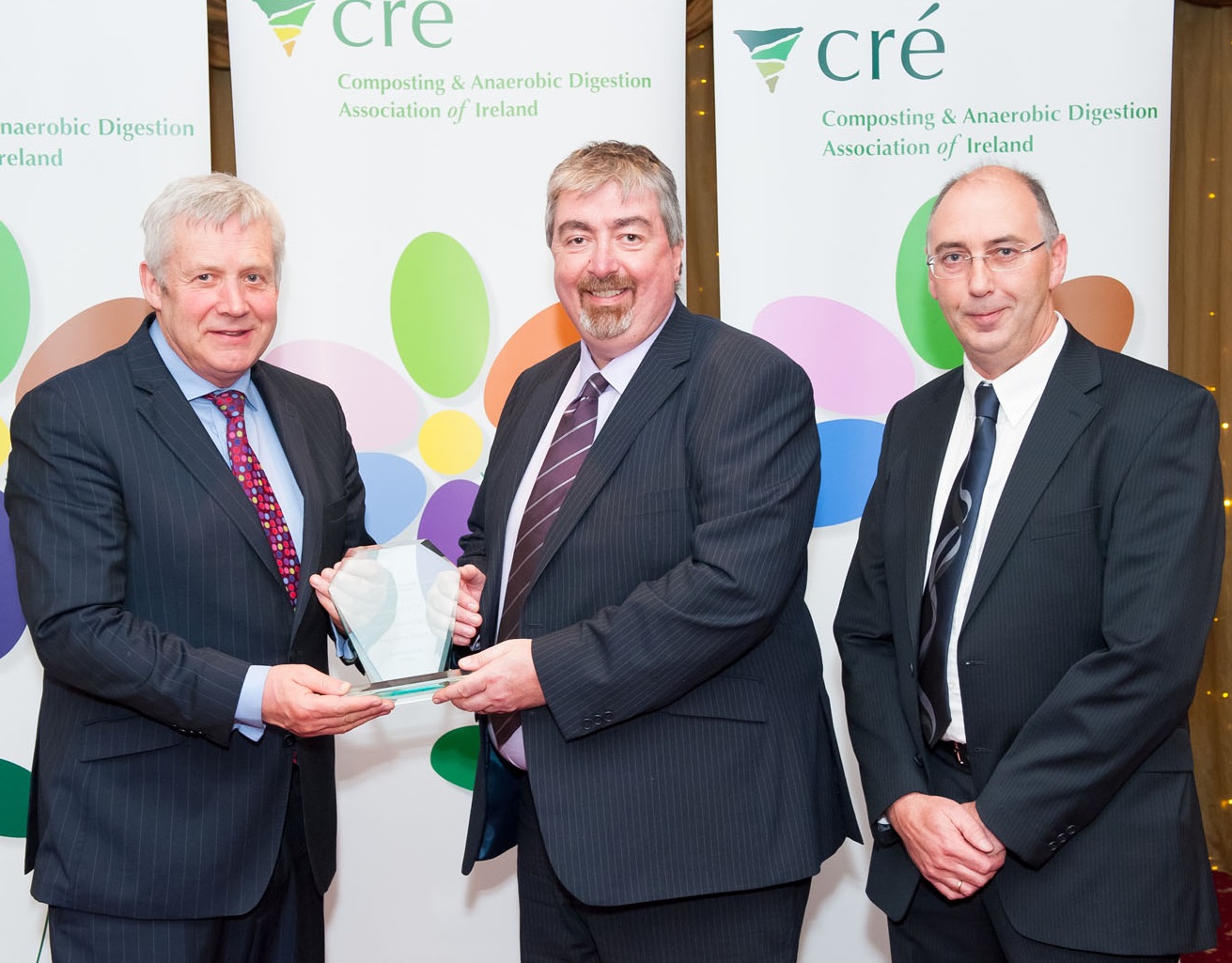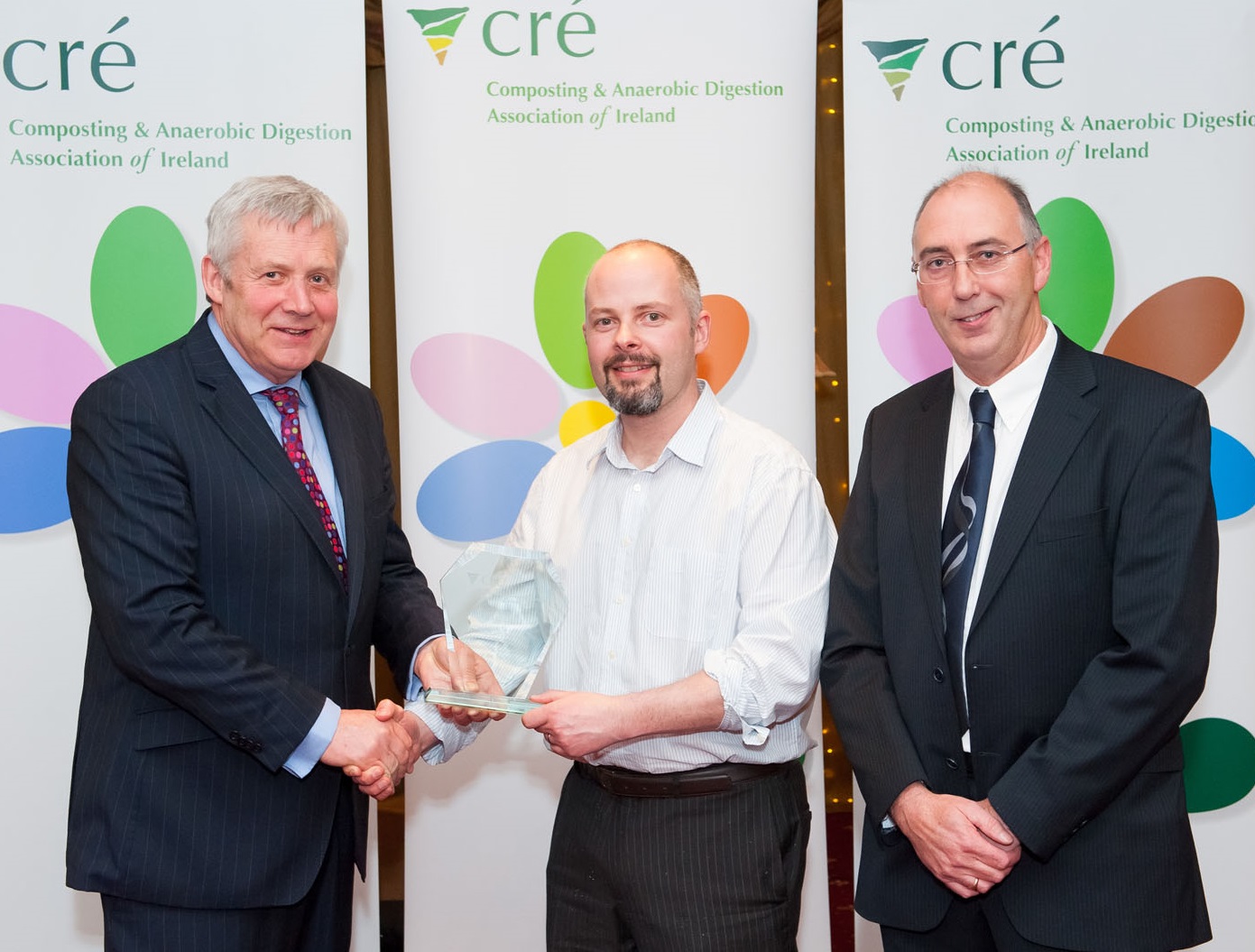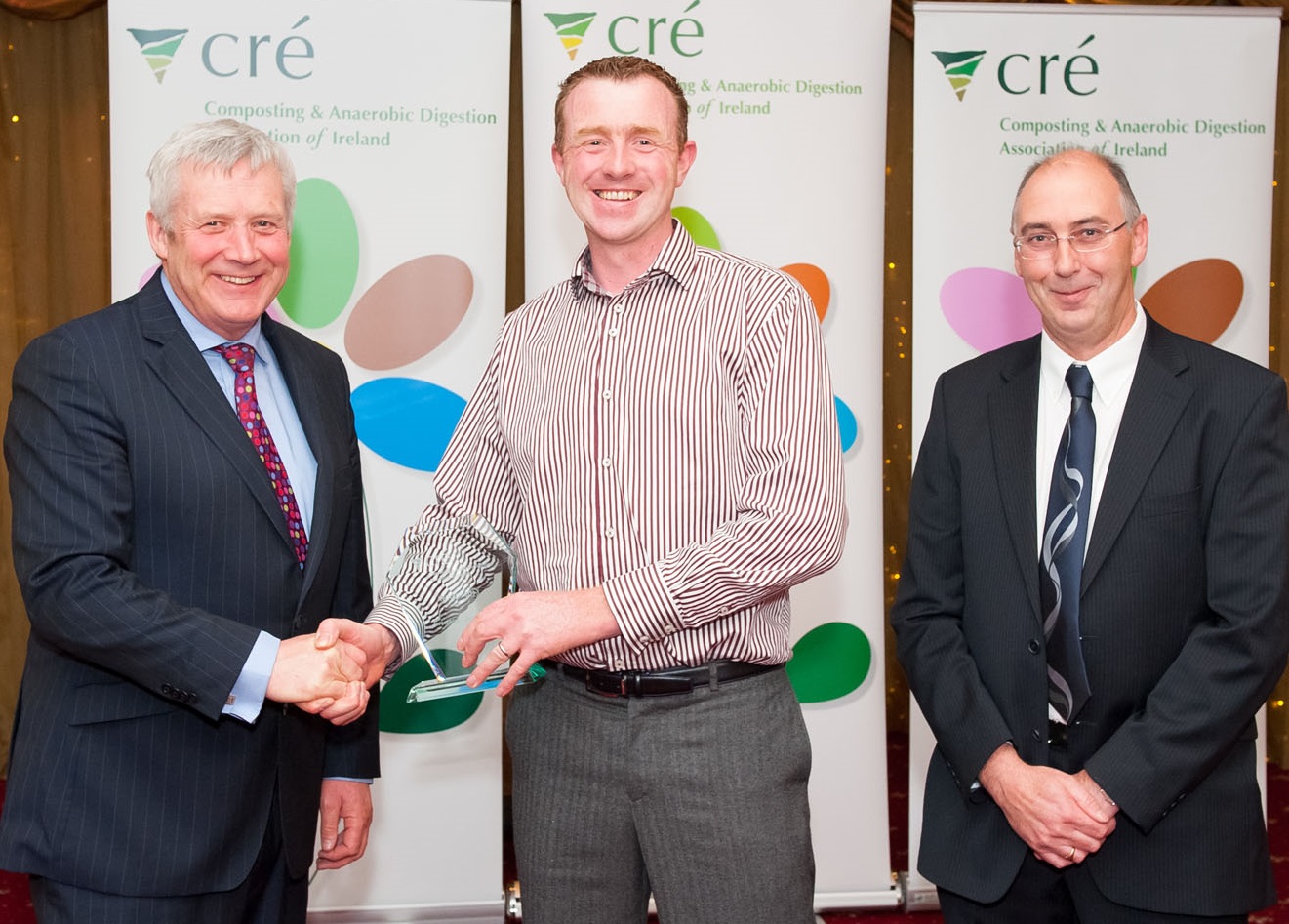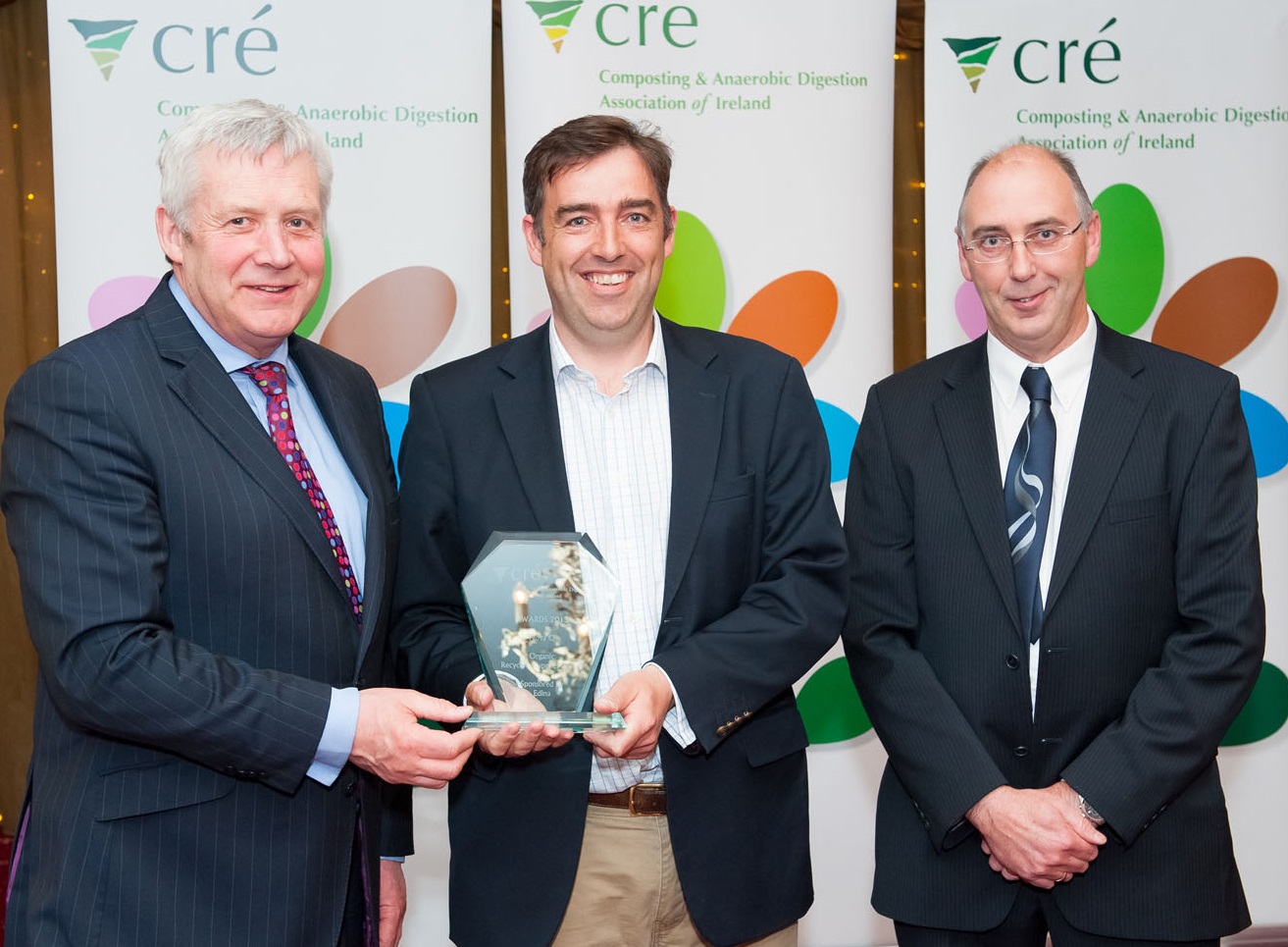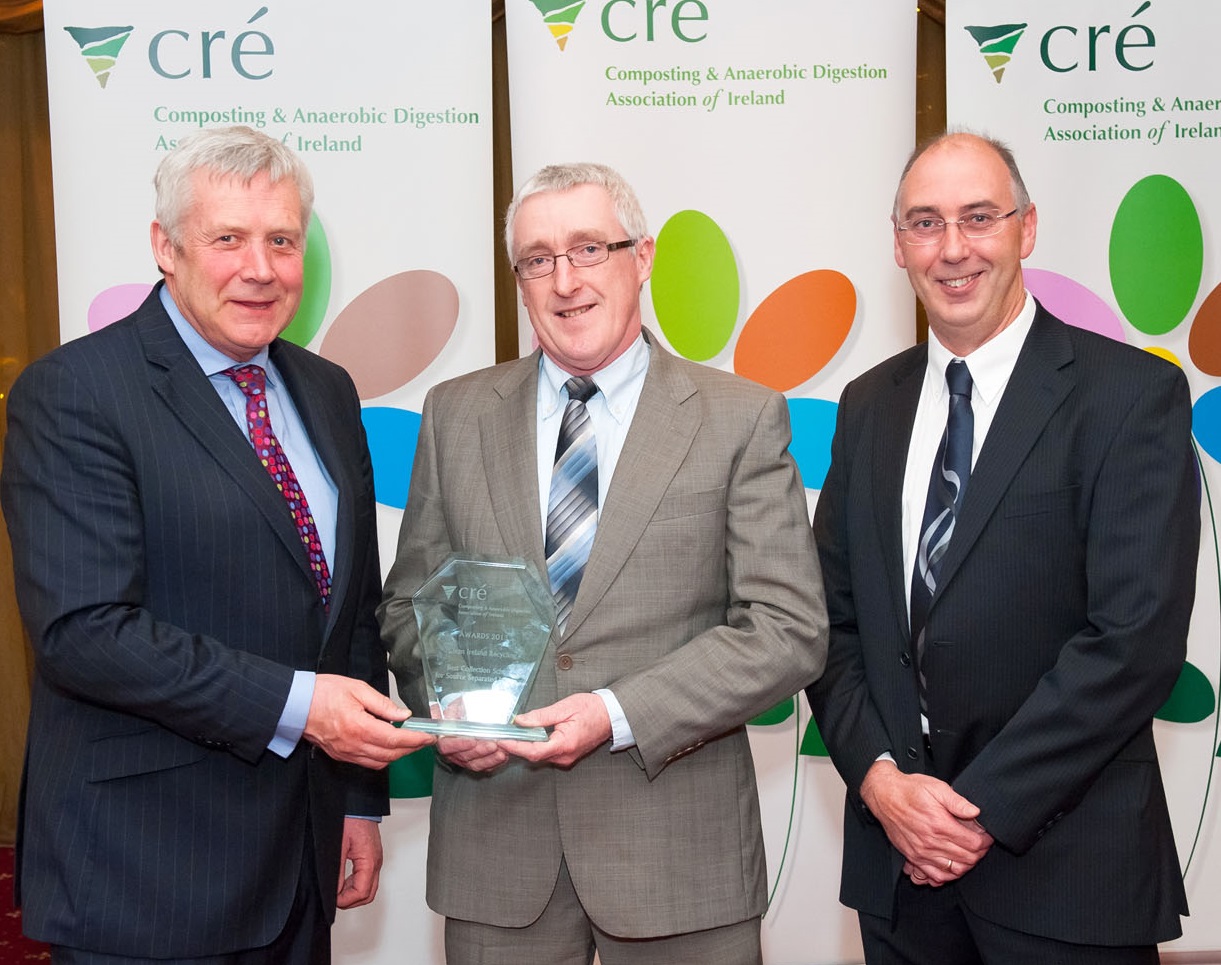Cre 2014 Guide to Compost & AD
Report on Brown Bin Educational Tools
Study Finds Raw Sewage Sludge Landspread in Ireland
PRESS RELEASE 8 OCTOBER
Study Finds Raw Sewage Sludge is being Landspread in Ireland
A new study by Cré on how sewage sludge is managed in Ireland was conducted by surveying local authorities.
The study found that approximately 24,000 tonnes of raw sewage sludge was applied to land in Ireland in 2012. This is a food safety issue as outlined in a 2008 report by the Food Safety Authority of Ireland (FSAI).
The practice of putting raw sewage sludge on land is allowed under Irish Regulations. In 2007, the FSAI met the Department of Environment, Community and Local Government to get the exemptions in the Regulations removed. The Department gave to the FSAI a commitment that a limited revision of the Regulations would be provided that would see a prohibition on the use of untreated sludge and the setting of standards for treated sludges.
This revision has not been carried out to-date.
Cré is calling on the Department to honour its commitment to the FSAI.
The report can be downloaded here – Sewage Sludge Management in Ireland
ENDS
Further Information:
Contact:
Percy Foster
Cré
T: 086 8129260
E: percy@cre.ie
About Cré
Cré is a non-profit Association that promotes composting, anaerobic digestion (AD) and the use of compost and digestate. Cré is the recognised national representative body for the composting and anaerobic digestion industry in Ireland and Northern Ireland. Cré is an active member of the European Compost Network and the European Biogas Association.
Compost Awareness Week 6-12 May
International Compost Awareness Week 2013 – May 6-12
A fun and educational week of events for;
promoting awareness of composting,
learning more about the many benefits of composting, and
broadening understanding of compost use
International Compost Awareness Week (ICAW) is the largest and most comprehensive education initiative of the compost industry worldwide. It is celebrated each year in the first full week of May.
This international campaign will take place from 6 to 12 May this year, using the message How Does Your Garden Grow………Compost!’. During the week, compost producers at all scales, local authorities and composting sites are encouraged to raise awareness about reasons for making and using composts, and the benefits from doing this.
In Ireland there are around 20 events taking place ranging from Master Composters doing demonstrations on how to home compost, scouts setting up a wormery in Mayo, compost talks to GIY groups to the Cré Compost Industry Awards. Details on all the events can be found on www.cre.ie
In Ireland, ICAW is organised by Cré, www.stopfoodwaste.ie and WRAP Northern Ireland.
Poster Competition
As part of ICAW a poster competition was held to design a poster to promote ICAW. Many people and kids around the country entered the competition. Joint winners are Lia Brady and Charlotte Doolin from Malahide Community School.
click here to download the poster:
| Event | Location | Date & Time |
| Cré Industry Awards | Waterside House Hotel, Donabate | 10th @ 7.30pm |
| ‘Stop Food Waste’ Home Composting Sites demos & talks | Check our interactive map for locations and contact details for your local area see www.stopfoodwaste.ie | demonstrations & talks during the week |
| LCK Regional Waste Management Office | Riverfest, Limerick City | 3rd – 6th |
| Cork County Council | Carrigtwohill, Yougal, Inniscarra and Newmarket | Throughout May |
| Meath County Council Seminars | Navan, Sonaitre | Last two weeks of May |
| Roscommon County CouncilEvent with master composters | Frenchpark | 21st of May |
| Clare | Burren Slow Food Festival | |
| Galway | Series of events throughout the county | |
| Wicklow County Council | Series of events throughout the county | |
| Mayo County Council | Castlebar Master Composter Demo Site |
| “Meet the Master Composter” | Clare Garden Festival | 28 April at 11am-5pm |
| Setting up a wormery with local scouts | Lough Lannagh Holiday village, Mayo | May 16th |
| Composting/food waste prevention talk to Castlebar GIY Group | Family Resource Centre in Castlebar, Mayo | Evening of May 13th |
| Food waste prevention /composting talk with Cong Tidy Towns. | Cong, Mayo | Evening of May 2nd |
ICAW is being organised by Cré and is supported by WRAP Northern Ireland and www.stopfoodwaste.ie
New Household Food Waste Regulations
Minister Hogan signs New Household Food Waste Regulations –Diversion of household Food Waste from disposal to resource recovery. (7/3/2013) Press Release Department of Environment
Mr Phil Hogan T.D., Minister for the Environment, Community and Local Government has signed the European Union (Household Food Waste and Bio -Waste) Regulations 2013 (S.I. No. 71 of 2013).
The regulations are designed to promote the segregation and recovery of household food waste. They will increase the amount of food waste that is recovered through the production of energy, compost and digestate, thereby creating opportunities for added jobs and value. In particular, the regulations will facilitate the achievement of the targets set out in Directive 99/31/EC on the landfill of waste for the diversion of biodegradable municipal waste from landfill sites, by directing source-segregated household food waste to composting and to other forms of treatment; and the new regulations were signalled in the recently published national waste management policy: “A Resource Opportunity –Waste Management Policy in Ireland”
The regulations will also meet requirements of the recently-transposed Waste Framework Directive, Directive 2008/98/EC. Along with the Waste Management (Food Waste) Regulations 2009 ( S.I. No. 508 of 2009), they complete Ireland’s requirements in relation to ( in particular) the application of the waste hierarchy and of the bio-waste and other recovery requirements of that directive.
The Household Food Waste Regulations impose obligations on:
• Waste collectors – who must provide a separate collection service for household food waste,
• Households that produce food waste – who must segregate such waste and keep it separate from other non-biodegradable waste, and have it separately collected by an authorised waste collector.
Householders may alternatively:
• Compost the food waste at home, or
• Bring the food waste to authorised treatment centres, for recovery in an environmentally acceptable way, such as civic amenity sites, anaerobic digestion sites or for incineration.
Households are not allowed to:
• macerate waste and dispose of it in a drain or sewer, or
• dispose of food waste in the residual waste collection( the black bin)
In accordance with the regulatory impact assessment prepared for these regulations, the roll-out of the brown bin will be phased in over the following timetable:
• 1st July 2013 for agglomerations > 25,000 persons;
• 31st December 2013 for agglomerations > 20,000 persons;
• 1st July 2014 for agglomerations > 10,000 persons;
• 1st July 2015 for agglomerations > 1,500 persons, and
• 1st July 2016 for agglomerations > 500 persons.
Information on current roll-out of brown bins (i.e. up to 2010, the latest date for which figures is available) is contained in Annex 3 of the regulatory impact assessment.
The Regulatory Impact Assessment can be located at the Department’s web site at the following link:
http://www.environ.ie/en/Legislation/Environment/Waste/WasteManagement/#d.en.18104
Draft Waste Management (Household Food Waste Collection) Regulations – Regulatory Impact Assessment (pdf, 1,838 kb)
Notes for editors:
1. The Regulations impose obligations on the householders to segregate their food waste, and make it available for separate collection.
2. Alternatively householders may subject the waste to home composting or bring the waste directly themselves to authorised treatment facilities.
3. Where a source-segregated collection for food waste is available, the Regulations include a general prohibition on the deposition of food waste in the residual waste collection service-the black bin.
4. In addition, obligated householders are prevented from shredding or hydrating food waste by mechanical devices to facilitate its discharge to the sewerage infrastructure.
5. The Regulations have practical application from differing phase in periods and over a period to 1st July 2016 brown bins will be rolled out to most towns and cities with only very small population areas being exempt or small islands or areas where it is simply not technically, environmentally or practical to separately collect such waste.
6. The Environmental Protection Agency’s (EPA) National Waste Report 2010 noted that the amount of biodegradable waste collected at kerbside from households only slightly increased in 2010-at 63,837 tons-over 2009 but this was expected to increase in 2011 and beyond.
7. By the end of 2010, 28 out of 34 local authority areas had kerbside organic bin collections.
8. An amount of 21,422 tons of household organic waste was separately collected at civic amenity sites in 2010. EPA estimates that organics comprise about 23% by weight of the gross household bin waste stream.
9. Home composting was estimated at 36,855 tons.
10. 35% of households with a collection service have a three-bin service (residual “black bin”, dry recyclables “green bin” and organics “brown bin”).
11. The quantity of biodegradable waste sent to landfill decreased by 19% in 2010 relative to 2009 to 860,000 tons and Ireland thus met its first Landfill Diversion target
Cré Industry Awards 2013
Cré Awards 2013
Compost and Biogas Industry Recognise Peers
The Cré Awards 2013 celebrated the hard work, dedication and success of organisations within the composting and anaerobic digestion industry both in Ireland and Northern Ireland.
An Awards Ceremony sponsored by Ecocem and Edina was held on May 10th in Dublin. Fergus O’Dowd T.D. Minister of State at the Department of Communications, Energy & Natural Resources and Environment, Community & Local Government presented the awards. The event rose much needed funds for the Irish Cancer Society.
Martin Eves (Chairman of Cré) said “congratulations to all the winners, every organisation is playing an important role in creating jobs within our sector. The InterTradeIreland market report estimated that our sector will grow to support 1,500 direct jobs and 1000’s of indirect jobs”.
David O’Flynn of Ecocem commented that “Ecocem are delighted to support these awards. It is great to see so many companies putting forward solutions to maximise value and minimise pollution associated with waste. We see clear synergies, with our cement providing a low carbon solution and improving concrete durability.”
“Edina is very proud of our connection with Cré, and we are delighted to continue our support through sponsoring of the Industry Awards. We congratulate all award winners and commend them on their commitment to this Industry” said Colin McKibbin of Edina.
The awards were judged by an independent panel of judges; Ian Garner (WRAP Northern Ireland), Karen Mahon (Alupro Ireland) and Eoin MaGennis (InterTradeIreland)
Industry Awards Kindly Sponsored by
The Ecocem-Cré Cup- Enrich, Meath
Lto R. Martin Eves (Chairman of Cré), Minister O’Dowd, Tim Duggan (Enrich)
& David O’Flynn (Ecocem- sponsor of award)
This award is for the best managed composting or biogas plant in Ireland. The main criteria for this award won by Enrich are -Evidence of excellence in site supervision, operational features, best management practices, teamwork, staff welfare, data management, local acceptability, methods or systems for environmental management, plant maintenance, marketing strategy for compost/digestate products and general impression.
The Edina Innovation Award- William Industrial Services, Antrim
Lto R. Minister O’Dowd, John Toner (William Industrial Services) & Martin Eves (Chairman of Cré)
The criteria for this award was to clearly demonstrate a ‘unique innovation that will or has led to increased economic benefit for the company or industry’
The biogas sector in Northern Ireland is developing rapidly with many plants being built on farms. Typically this technology had been imported from other countries and had evolved specific to these countries. William Industrial Service has demonstrated that the feedstock specific to Ireland, being primarily grass/silage based, required a fresh approach to biogas technology.
William Industrial Service developed a technology that suits the feedstock in Ireland. Their technology is designed to be customer specific and suits the business environment in Ireland. The average pay back for AD plants is 7 years – with this new technology, a 500KW plant has a typical payback of 2.7 years. William Industrial Service’s first plant is now operational.
Outstanding Contribution to the Sector- Down2Earth Materials, Cork
Lto R. Minister O’Dowd, John Lynch (Down2Earth Materials) & Martin Eves (Chairman of Cré)
There was a broad range of applications for this category, ranging from how research can benefit the sector to companies demonstrating the work they are doing in persuading the general public to accept and use the brown bin.
Down2Earth Material’s range of compostable packaging combined with the work they undertook to educate the general public on how to use compostable products has assisted the consumer in having a better understanding of how food waste should be segregated and presented to our sector for further processing.
Highly Commended-Greenking Composting, Wicklow
Lto R. Minister O’Dowd, Paddy King (Greenking Composting) & Martin Eves (Chairman of Cré)
In recognition of a composting facility which has clearly shown itself as an example for the industry to follow, the winner of the 2013 Cre ‘Highly Commended’ Award is – Greenking Composting in Wicklow.
Organics Recycling Suppliers Award- Nova Q, Dublin
Lto R. Minister O’Dowd, Julian Beatty (Nova Q) & Martin Eves (Chairman of Cré)
One of the main criteria for this category was “to demonstrate a machinery or service solution which increased efficiencies at a compost/biogas plant while adding value to the outputs”.
Nova Q, winner of this award supplies a microbial inoculant which is being used at several composting facilities in Ireland. It has been proven to enhance the composting process, provides more capacity in plants and has facilitated in enhancing both process and environmental controls.
Best Collection Scheme for Source Separated Material-
Clean Ireland Recycling, Clare
Lto R. Minister O’Dowd, Michael O’Donaghue (Clean Ireland Recycling)
& Martin Eves (Chairman of Cré)
Contamination of the brown bin is a huge problem within our sector with contamination rates high. We are all aware of the challenge of getting households to use the brown bin and to present it properly.
Entrants for this category had to demonstrate methods of promoting separate collection and highlight innovative ways to educate users and control contamination. Success was measured on participation and contamination rates. It must be said that this category attracted a number of excellent collection schemes.
Clean Ireland Recycling, winner of this category has taken a European model for food waste only collections and has demonstrated that it can be done successfully in Ireland. An independent audit by their local authority demonstrated a 69% participation rate and contamination levels of only 1-2%. Clean Ireland Recycling Ltd uses a ‘pay by weight’ charging mechanism, creating transparency to the householder therefore demonstrating the financial savings that can be made by using the brown bin.
Cre Training Courses in 2013
Cre has announced the following training course in 2013:
How Good is Your Compost? Planning for an Anaerobic Digestion Facility Certificate in Compost Facility Operation HACCP for Anaerobic Digestion and Composting Sites Health and Safety on Your Composting Site See http://www.cre.ie/web/eventstraining/ to download course brochuresNew Compost Quality Assurance Scheme & Compost Quality Mark Launched
New Compost Quality Assurance Scheme & Compost Quality Mark Launched
Wednesday, 17th October 2012: Mr. Phil Hogan, T.D., Minister for the Environment, Community & Local Government awarded certificates to four composting facilities from around Ireland to be accredited under the country’s first ever Compost Quality Assurance Scheme CQAS 441 and compost quality mark, which encompasses the Irish Standard for compost quality (I.S. 441). Each of the facilities certified today creates quality compost from garden and/or food waste collected in Ireland. Presenting CQAS 441 certificates today Minister for the Environment, Community & Local Government, Mr Phil Hogan, T.D., said “The New National Waste Policy, A Resource Opportunity, published in July, clearly points to where I want to see the sector develop. My priority is to see the maximum resource derived from what is currently seen as waste. I want to see the maximum value extracted in Ireland in terms of value and of jobs. The compost sector is an example of a successful indigenous industry that has the potential to grow even further when we roll out brown bins to the majority of homes to collect garden and food waste over the next four years.”
The Minister added “My new waste policy, and proposed household food waste regulations emphasise the need for Ireland to use waste as a resource and CQAS 441 encourages producers to divert bio-waste knowing that it will be used to manufacture quality compost. I have made my commitment to the move from landfill to productive uses for waste resources clear from the very start. The twin track approach of developing a national standard for compost as well as a quality assurance scheme shows the type of sophisticated approaches that were required and which thankfully we have embraced to successfully deal with tackling the levels of biowaste.” The CQAS 441Compost Quality Assurance Mark has been developed for use only by production sites that have reached this standard and are certified.
The four facilities certified today primarily supply high quality compost to the commercial horticulture, landscaping and agriculture sectors. More facilities will be certified to produce quality assured compost that will be packaged in smaller quantities for sale to householders and the retail sector.
“I encourage all composting operators in the private and the public sector to be compliant with the I.S. 441 and to get their facility up to standard to allow it to achieve CQAS 441 certification – it makes good business sense and is good for the environment too,” said Minister Hogan.
Certified Facilities
The following facilities were presented with CQAS 441 Composting Quality Assurance Scheme Certificates today:
1. Enrich from Kilcock, Co. Meath
2. Bord na Móna, Kilberry, Co. Kildare
3. Cremins Farm Compost Ltd, Charleville, Co. Limerick
4. Limerick County Council.
The composting industry called for the need for third party certification of processes and products in composting facilities in order to bring the industry into line with European best practice and to help increase competitiveness. A certified facility must implement prescribed procedures thereby requiring more manpower and creating jobs in order to produce a higher quality end product. This work is supported by additional revenue from quality compost sales. CQAS 441 is audited and managed by Certification Europe under the rx3 programme to develop markets for recyclable materials here in Ireland, funded by the Department of the Environment, Community & Local Government. For more information visit www.rx3.ie or lo-call 1890-732925.
Minister O’Neill Highlights Benefit of AD ahead of ADNI
Minister O’Neill Highlights the Benefits of on-Farm Renewable Energy
Ahead of the Cre conference on anaerobic digestion, Minster O’Neill made this press release
Northern Ireland Anaerobic Digestion Conference
Cre hosted the inaugural Northern Ireland Anaerobic Digestion Trade Show and Conference – ‘AD NI’ on 3 October 2012 in the Hilton Hotel Templepatrick, Belfast.
Since the Renewable Obligations Certificates were launched, there have been nearly 80-90 planning applications to build mostly on farm anaerobic digestion plants. Of these applications approximately 30 have received full planning permission.
Cre and other organisations have hosted events to educate people on anaerobic digestion. At this stage, Cre wanted to take stock of developments since ROCs were launched to review, assess, debate issues and opportunities arising around the development of the anaerobic digestion industry. Recently there have been some real issues arising such as securing feedstocks and gaining finance.
The event was attended by 120 people.
The event’s main sponsors were ECOCEM and Clarke Energy. Full details can be found on www.adni2012.co.uk
Presentations from the event can be downloaded from http://www.cre.ie/web/old-events/
